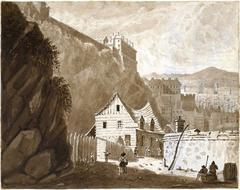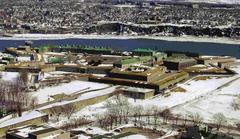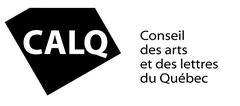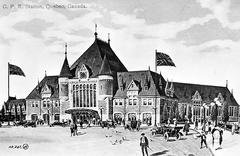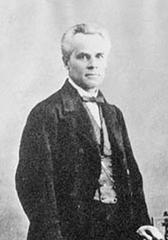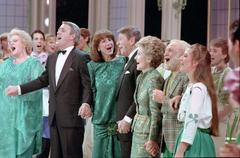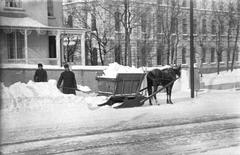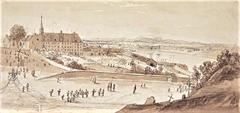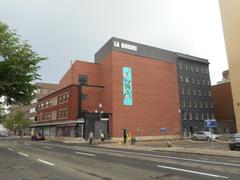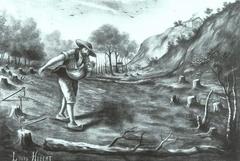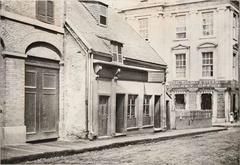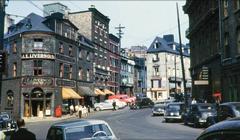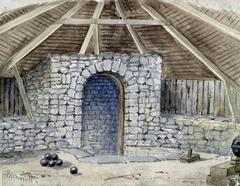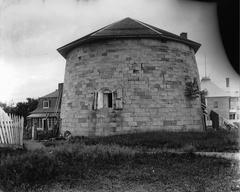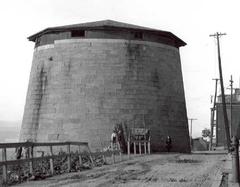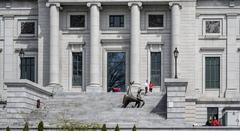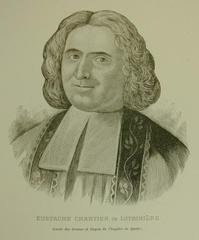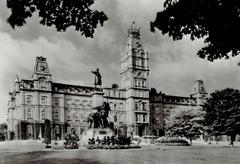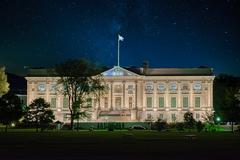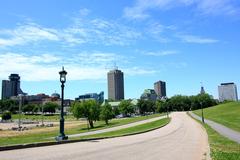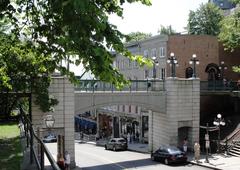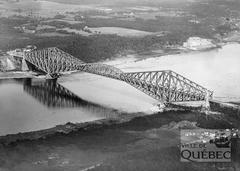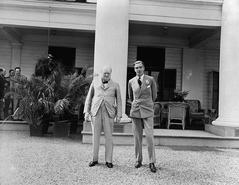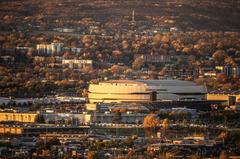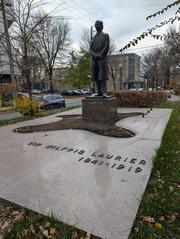
Édifice Marie-Guyart: Visiting Hours, Tickets, and Quebec City Historical Sites Guide
Date: 04/07/2025
Introduction
Nestled atop Quebec City’s Colline Parlementaire, the Édifice Marie-Guyart is an architectural and cultural icon. As the tallest building in Quebec City and the tallest office tower east of Montreal, its bold Brutalist silhouette houses key government ministries and the renowned Observatoire de la Capitale. This comprehensive guide provides detailed insights into the building’s history, cultural significance, visiting hours, ticketing, accessibility, travel tips, and nearby attractions—ensuring you make the most of your visit to one of Quebec’s most pivotal landmarks. (Ville de Québec, Observatoire de la Capitale, Wikipedia)
Table of Contents
- Introduction
- Historical Background
- Visiting Information
- Observatoire de la Capitale
- Visuals and Media
- Frequently Asked Questions (FAQ)
- Conclusion
- Call to Action
Historical Background
Origins and Planning
Édifice Marie-Guyart, originally known as Complexe G, was conceived during Quebec’s Quiet Revolution of the 1960s—a time of swift modernization and expansion of provincial government functions. The need for new administrative infrastructure led to plans for a modern office complex on Parliament Hill. Initial designs called for a cluster of towers; ultimately, only the main tower was realized (Ville de Québec, Société québécoise des infrastructures).
Construction and Architecture
Completed in 1972 after five years of construction, Édifice Marie-Guyart rises 132 meters (433 feet) over 33 stories, making it the city’s tallest structure (Wikipedia). The project, led by the teams of Fiset, Deschamps & Bartha and Gauthier, Guité, Roy, is a signature example of Brutalism. Its prefabricated concrete panels, alternating window patterns, and cantilevered upper floors create a monumental presence. Innovative Vierendeel beams permit column-free interior spaces, while the building’s four interconnected blocks are linked by an extensive underground parking garage and terrace (Société québécoise des infrastructures).
Naming and Symbolism
In 1987, the building was renamed in honor of Marie Guyart (Marie de l’Incarnation), a pioneering Ursuline nun who established Quebec’s first Ursuline convent in 1639 and contributed significantly to education and the cultural development of New France (Wikipedia, Toponymie Québec). The renaming marked the 350th anniversary of the Ursulines in Quebec City, reinforcing the tower’s symbolic ties to Quebec’s religious and educational heritage.
Role in Quebec’s Urban Landscape
Strategically located at 675, boulevard René-Lévesque Est, Édifice Marie-Guyart anchors Quebec’s governmental district. Its construction was part of a broader redevelopment plan to modernize Parliament Hill and centralize provincial ministries, including Education and the Environment (Société québécoise des infrastructures, Wikipedia). The tower’s presence dominates the city’s skyline and provides a visual link between Quebec’s historic past and its modern future.
Heritage Significance
Recognized as a landmark of Quebec modernism, Édifice Marie-Guyart is celebrated for its uncompromising Brutalist aesthetics, innovative engineering, and integration into the urban fabric. The building is listed in municipal and provincial heritage protection registers, and a major restoration in 2010 preserved its architectural integrity (Société québécoise des infrastructures).
Visiting Information
Visiting Hours
- Édifice Marie-Guyart Offices: Open Monday to Friday, 8:30 AM to 4:30 PM (government offices only).
- Observatoire de la Capitale: Usually open daily from 9:00 AM to 10:00 PM, but hours may vary seasonally. The observatory is closed on certain public holidays; check the official website for current information.
Tickets and Admission
- Building Admission: Free (lobby and office areas; security restrictions apply).
- Observatoire de la Capitale:
- Adults: $8–$14.75 CAD (varies by season and ticket type)
- Seniors (65+): Discounted rates available
- Students/Youth: Discounted rates
- Children under 6: Free
- Group rates and special panoramic passes available
- Where to Buy: Tickets must be purchased online in advance; no on-site sales. Visit the official website for details.
Accessibility
Édifice Marie-Guyart and the Observatoire de la Capitale are fully accessible. Elevators serve all public areas, and accessible washrooms and signage are provided. Some areas may have temporary restrictions; check ahead if you have specific needs (Observatoire de la Capitale – Accessibility).
Guided Tours and Special Events
Guided tours focusing on the building’s history, architecture, and Quebec City’s urban evolution are available, as well as school and group programs. The observatory frequently hosts cultural events and educational exhibitions. For schedules and reservations, consult the Observatoire de la Capitale website.
Nearby Attractions
Édifice Marie-Guyart is minutes away from:
- Parliament Building (Assemblée nationale du Québec)
- Old Quebec (UNESCO World Heritage Site)
- The Citadel
- Plains of Abraham
- Château Frontenac
The district also offers parks, cafés, and museums—ideal for extending your visit.
Observatoire de la Capitale
Situated on the 31st floor, the Observatoire de la Capitale offers unrivaled 360-degree views from 221 meters (725 feet) above sea level. Floor-to-ceiling windows showcase:
- Old Québec and Château Frontenac
- St. Lawrence River and Île d’Orléans
- Plains of Abraham
- The Citadelle
- The Laurentian Mountains
Interactive exhibits, multilingual audioguides, and interpretive panels enrich your visit with historical and geographical context (Wikipedia, AFAR).
Visuals and Media
High-resolution images of the building, observation deck, and panoramic cityscapes are available on the official website. Virtual tours, photo galleries, and downloadable maps help you plan your route and enhance your experience. Use alt tags like “Édifice Marie-Guyart visiting hours view” or “Quebec City skyline from Observatoire de la Capitale” for accessibility and SEO.
Frequently Asked Questions (FAQ)
Q: What are the visiting hours?
A: The Observatoire de la Capitale is generally open daily from 9:00 AM to 10:00 PM, but hours may vary. Check the official website before your visit.
Q: How do I buy tickets?
A: Tickets must be purchased online in advance through the official website.
Q: Is the observatory accessible?
A: Yes, the building and observatory offer barrier-free access and accessible facilities.
Q: Are there guided tours?
A: Yes, guided tours are available and can be booked in advance.
Q: Can I take photos?
A: Yes, photography is encouraged; tripods may be restricted during busy times.
Q: Are pets allowed?
A: Only service animals are permitted.
Q: What languages are the audioguides in?
A: Audioguides are available in French and English.
Conclusion
Édifice Marie-Guyart is a must-see for anyone interested in Quebec City’s rich history, modern architecture, and sweeping urban views. With its blend of governmental significance, public engagement, and breathtaking perspectives from the Observatoire de la Capitale, the building serves as a symbol of Quebec’s vibrant heritage and dynamic present. Plan ahead for tickets and hours, and immerse yourself in the city’s unique identity.
Call to Action
Enhance your Quebec City adventure by downloading the Audiala app for interactive tours, exclusive content, and travel tips. Follow us and the Observatoire de la Capitale on social media for updates on events, new exhibitions, and the latest guides to Quebec City’s historical sites. For more details, visit the official website.
References
- Ville de Québec – Édifice Marie-Guyart
- Société québécoise des infrastructures – Édifice Marie-Guyart
- Wikipedia – Édifice Marie-Guyart
- Observatoire de la Capitale Official Website
- Ville de Québec Historical Timeline
- Toponymie Québec – Marie Guyart
- AFAR – Observatoire de la Capitale
- Manoir d’Auteuil – Admire Quebec City from Its Highest Point
- Assemblée nationale du Québec – Édifice Marie-Guyart



